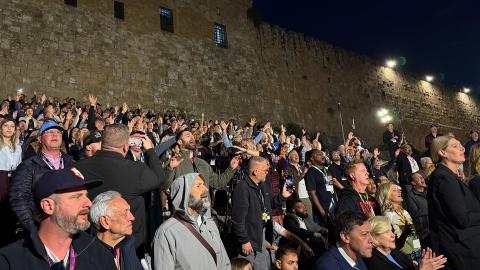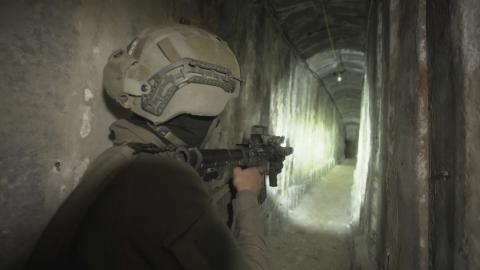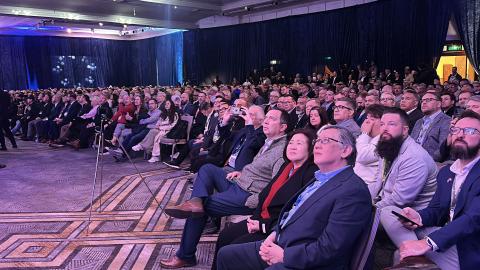Netanyahu: 'Sacred Duty' to Make Israel's Case
JERUSALEM, Israel -- Israeli Prime Minister Benjamin Netanyahu says it's his 'sacred duty' to go to Washington, D.C., and speak in Congress to "make the best case for Israel that I can."
Speaking Monday evening to American Jewish leaders at the annual gathering in Jerusalem of the Conference of Presidents of Major American Jewish organizations, Netanyahu told participants in less than eight minutes why he felt it was important for him to go to the United States and talk about Iran.
Netanyahu has been at loggerheads with the White House for weeks over an invitation to address Congress on the topic of Iran. The meeting comes just two weeks before Israeli general elections and his opponents claim he has political motives.
But Netanyahu outlined his reasoning by answering three questions: Why is he going to Washington; why is speaking to Congress; and why now?
"I'm going to Washington because [as] the prime minister of Israel it's my obligation to do everything in my power to prevent the conclusion of a bad deal that could threaten the survival of the State of Israel," he said.
Netanyahu said the current deal that the United States and P5+1 powers are working on with Iran would enable Iran to break out with a serious nuclear device in "an unacceptably short time."
It would also allow Iran to develop an "industrial capability" to enrich uranium that could "provide the fuel for many bombs in the coming years."
"A regime that openly calls for Israel's destruction would thus have finally the means to realize its genocidal aims," he said.
Netanyahu, as he has said many times before, reiterated that he is not opposed to a deal, only a bad one.
"I believe this is a very bad deal," he said.
Netanyahu said he isn't opposed to negotiations but he said the current proposal would not solve the problem, only make it worse.
"It would provide the path for Iran to become a nuclear power," he said.
Netanyahu said he will address Congress because "Israel has been offered an opportunity to make its case on this crucial issue before the world's most important parliament."
He said Congress will play an important role in applying pressure to the regime and because Congress may "have a say in the parameters" of a final deal.
Netanyahu also turned the tables on his political opponents who have accused him of using the issue for political gain and damaging U.S.-Israel relations.
He said the question should be asked, "How could any responsible Israeli prime minister refuse to speak to Congress?"
Netanyahu said he is going now because the deadline for reaching an agreement is March 24.
"Now is the time for Israel to make its case. Now, before it's too late," he said.
Netanyahu challenged his audience to remember that there was a time when Jews couldn't speak on their own behalf. "Well we can and we do now."
Netanyahu said the answer to all three questions he posed is the same: "because of the great dangers posed by the deal that is on the table right now."
Netanyahu said the greatest danger facing humanity is if a militant Islamic regime arms itself with nuclear weapons.
He said a nation like Iran that is rampaging through the region gets nuclear weapons, "the whole world will be in peril."
He pointed out that Iran is already controlling four capitals through its proxies (Lebanon, Syria, Iraq, and Yemen). And with nuclear weapons, Iran would be much more dangerous.
Netanyahu said he could not guarantee that his speech in Congress would prevent the deal with Iran from being signed.
But, he said, "It's my sacred duty as prime minister of Israel to make Israel's case. On March 3, I'll fulfill that duty representing all the citizens of Israel before the two houses of Congress, and I will make the best case for Israel that I can, knowing that our case is just, that our case is sound and that our case offers the best hope to resolve this issue peacefully."
Earlier in the day, Malcolm Hoenlein, executive vice chairman of the Conference of Presidents of Major American Jewish organizations, said it was up the Netanyahu whether or not he accepts the invitation to speak to Congress.
But he said that Netanyahu has an important message to deliver.
"I think the whole world has to hear it," Hoelein told CBN News. "I think that the urgency of this issue is beyond parallel right now.
"This is the number one critical issue and when you have a threat like this we need every opportunity," he said.
"I hope it can be separated from some of the peripheral disputes and other issues. It shouldn't be a partisan issue. It should be one that unifies Congress and the administration, Democrats and Republicans, people across the board because we all want the same thing and that's not to see Iran with a nuclear weapon."



